A Comprehensive Comparison: IFRS and German GAAP Accounting Standards
VerifiedAdded on 2020/10/22
|37
|11942
|146
Project
AI Summary
This project provides a comprehensive comparison between International Financial Reporting Standards (IFRS) and German Generally Accepted Accounting Principles (GAAP). It begins with an introduction to IFRS, its objectives, and its role in global accounting, highlighting the support from international organizations and the shift from US GAAP. The study then explores the historical context of German accounting practices, tracing their evolution from the 14th century to the modern era, and the impact of the Bilanzrechtsmodernisierungsgesetz. The research establishes goals to study German GAAP and IFRS, using case studies to analyze financial statements from 2015 and 2016. The literature review covers the background of IFRS, its key differences from German GAAP, and the importance of IFRS adoption in Germany, including the preference of IFRS over U.S. GAAP. The methodology section outlines the research design, data collection methods, and analysis techniques. The results section focuses on the key differences between the two standards, including asset and liability recognition, impairment losses, and foreign currency translation. A case study is included to demonstrate the practical application and impact of these differences. The project concludes with a discussion of the findings, limitations, and answers to research questions, supported by academic references.

Wanda dissertation paraphrasing
Paraphrase This Document
Need a fresh take? Get an instant paraphrase of this document with our AI Paraphraser
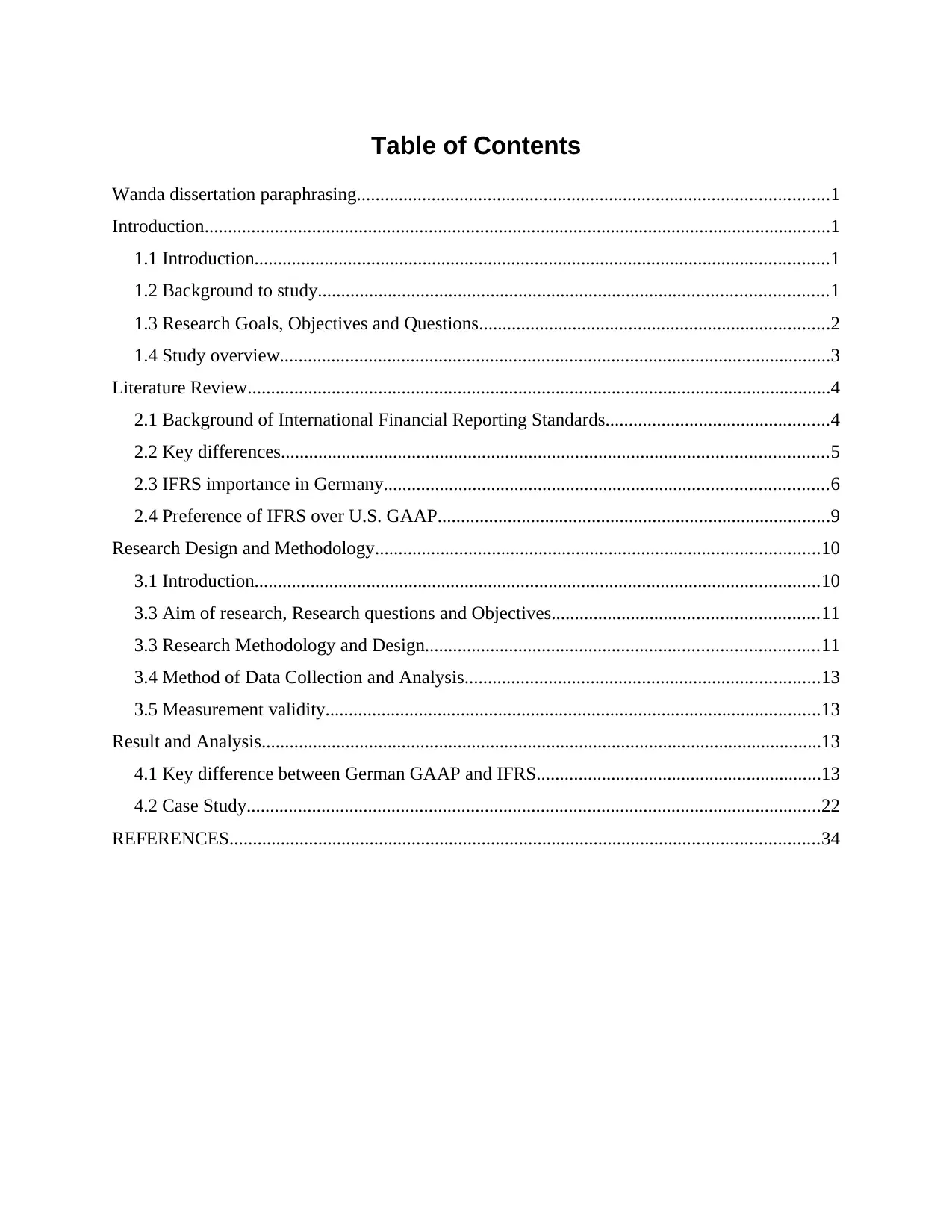
Table of Contents
Wanda dissertation paraphrasing.....................................................................................................1
Introduction......................................................................................................................................1
1.1 Introduction...........................................................................................................................1
1.2 Background to study.............................................................................................................1
1.3 Research Goals, Objectives and Questions...........................................................................2
1.4 Study overview......................................................................................................................3
Literature Review.............................................................................................................................4
2.1 Background of International Financial Reporting Standards................................................4
2.2 Key differences.....................................................................................................................5
2.3 IFRS importance in Germany...............................................................................................6
2.4 Preference of IFRS over U.S. GAAP....................................................................................9
Research Design and Methodology...............................................................................................10
3.1 Introduction.........................................................................................................................10
3.3 Aim of research, Research questions and Objectives.........................................................11
3.3 Research Methodology and Design....................................................................................11
3.4 Method of Data Collection and Analysis............................................................................13
3.5 Measurement validity..........................................................................................................13
Result and Analysis........................................................................................................................13
4.1 Key difference between German GAAP and IFRS.............................................................13
4.2 Case Study...........................................................................................................................22
REFERENCES..............................................................................................................................34
Wanda dissertation paraphrasing.....................................................................................................1
Introduction......................................................................................................................................1
1.1 Introduction...........................................................................................................................1
1.2 Background to study.............................................................................................................1
1.3 Research Goals, Objectives and Questions...........................................................................2
1.4 Study overview......................................................................................................................3
Literature Review.............................................................................................................................4
2.1 Background of International Financial Reporting Standards................................................4
2.2 Key differences.....................................................................................................................5
2.3 IFRS importance in Germany...............................................................................................6
2.4 Preference of IFRS over U.S. GAAP....................................................................................9
Research Design and Methodology...............................................................................................10
3.1 Introduction.........................................................................................................................10
3.3 Aim of research, Research questions and Objectives.........................................................11
3.3 Research Methodology and Design....................................................................................11
3.4 Method of Data Collection and Analysis............................................................................13
3.5 Measurement validity..........................................................................................................13
Result and Analysis........................................................................................................................13
4.1 Key difference between German GAAP and IFRS.............................................................13
4.2 Case Study...........................................................................................................................22
REFERENCES..............................................................................................................................34
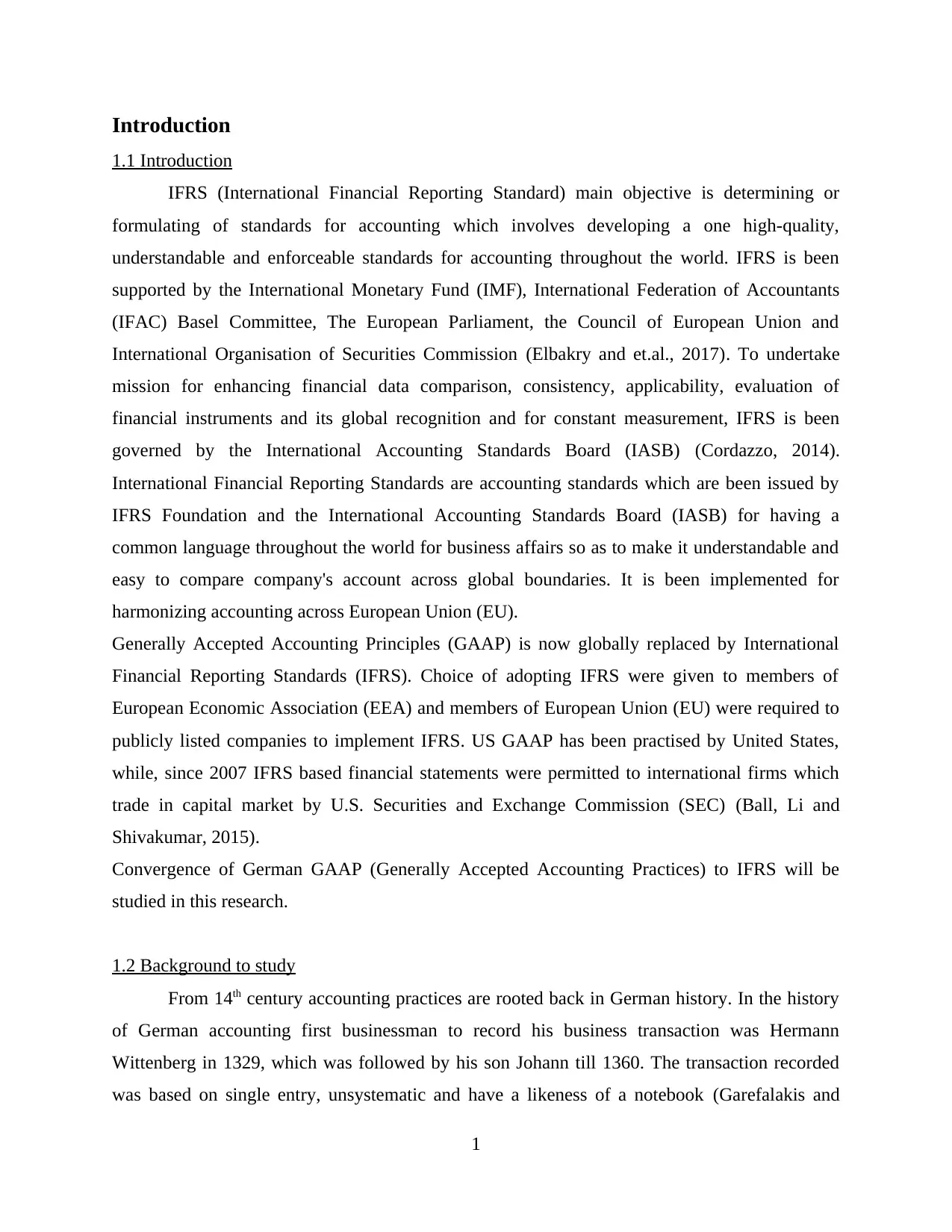
Introduction
1.1 Introduction
IFRS (International Financial Reporting Standard) main objective is determining or
formulating of standards for accounting which involves developing a one high-quality,
understandable and enforceable standards for accounting throughout the world. IFRS is been
supported by the International Monetary Fund (IMF), International Federation of Accountants
(IFAC) Basel Committee, The European Parliament, the Council of European Union and
International Organisation of Securities Commission (Elbakry and et.al., 2017). To undertake
mission for enhancing financial data comparison, consistency, applicability, evaluation of
financial instruments and its global recognition and for constant measurement, IFRS is been
governed by the International Accounting Standards Board (IASB) (Cordazzo, 2014).
International Financial Reporting Standards are accounting standards which are been issued by
IFRS Foundation and the International Accounting Standards Board (IASB) for having a
common language throughout the world for business affairs so as to make it understandable and
easy to compare company's account across global boundaries. It is been implemented for
harmonizing accounting across European Union (EU).
Generally Accepted Accounting Principles (GAAP) is now globally replaced by International
Financial Reporting Standards (IFRS). Choice of adopting IFRS were given to members of
European Economic Association (EEA) and members of European Union (EU) were required to
publicly listed companies to implement IFRS. US GAAP has been practised by United States,
while, since 2007 IFRS based financial statements were permitted to international firms which
trade in capital market by U.S. Securities and Exchange Commission (SEC) (Ball, Li and
Shivakumar, 2015).
Convergence of German GAAP (Generally Accepted Accounting Practices) to IFRS will be
studied in this research.
1.2 Background to study
From 14th century accounting practices are rooted back in German history. In the history
of German accounting first businessman to record his business transaction was Hermann
Wittenberg in 1329, which was followed by his son Johann till 1360. The transaction recorded
was based on single entry, unsystematic and have a likeness of a notebook (Garefalakis and
1
1.1 Introduction
IFRS (International Financial Reporting Standard) main objective is determining or
formulating of standards for accounting which involves developing a one high-quality,
understandable and enforceable standards for accounting throughout the world. IFRS is been
supported by the International Monetary Fund (IMF), International Federation of Accountants
(IFAC) Basel Committee, The European Parliament, the Council of European Union and
International Organisation of Securities Commission (Elbakry and et.al., 2017). To undertake
mission for enhancing financial data comparison, consistency, applicability, evaluation of
financial instruments and its global recognition and for constant measurement, IFRS is been
governed by the International Accounting Standards Board (IASB) (Cordazzo, 2014).
International Financial Reporting Standards are accounting standards which are been issued by
IFRS Foundation and the International Accounting Standards Board (IASB) for having a
common language throughout the world for business affairs so as to make it understandable and
easy to compare company's account across global boundaries. It is been implemented for
harmonizing accounting across European Union (EU).
Generally Accepted Accounting Principles (GAAP) is now globally replaced by International
Financial Reporting Standards (IFRS). Choice of adopting IFRS were given to members of
European Economic Association (EEA) and members of European Union (EU) were required to
publicly listed companies to implement IFRS. US GAAP has been practised by United States,
while, since 2007 IFRS based financial statements were permitted to international firms which
trade in capital market by U.S. Securities and Exchange Commission (SEC) (Ball, Li and
Shivakumar, 2015).
Convergence of German GAAP (Generally Accepted Accounting Practices) to IFRS will be
studied in this research.
1.2 Background to study
From 14th century accounting practices are rooted back in German history. In the history
of German accounting first businessman to record his business transaction was Hermann
Wittenberg in 1329, which was followed by his son Johann till 1360. The transaction recorded
was based on single entry, unsystematic and have a likeness of a notebook (Garefalakis and
1
⊘ This is a preview!⊘
Do you want full access?
Subscribe today to unlock all pages.

Trusted by 1+ million students worldwide
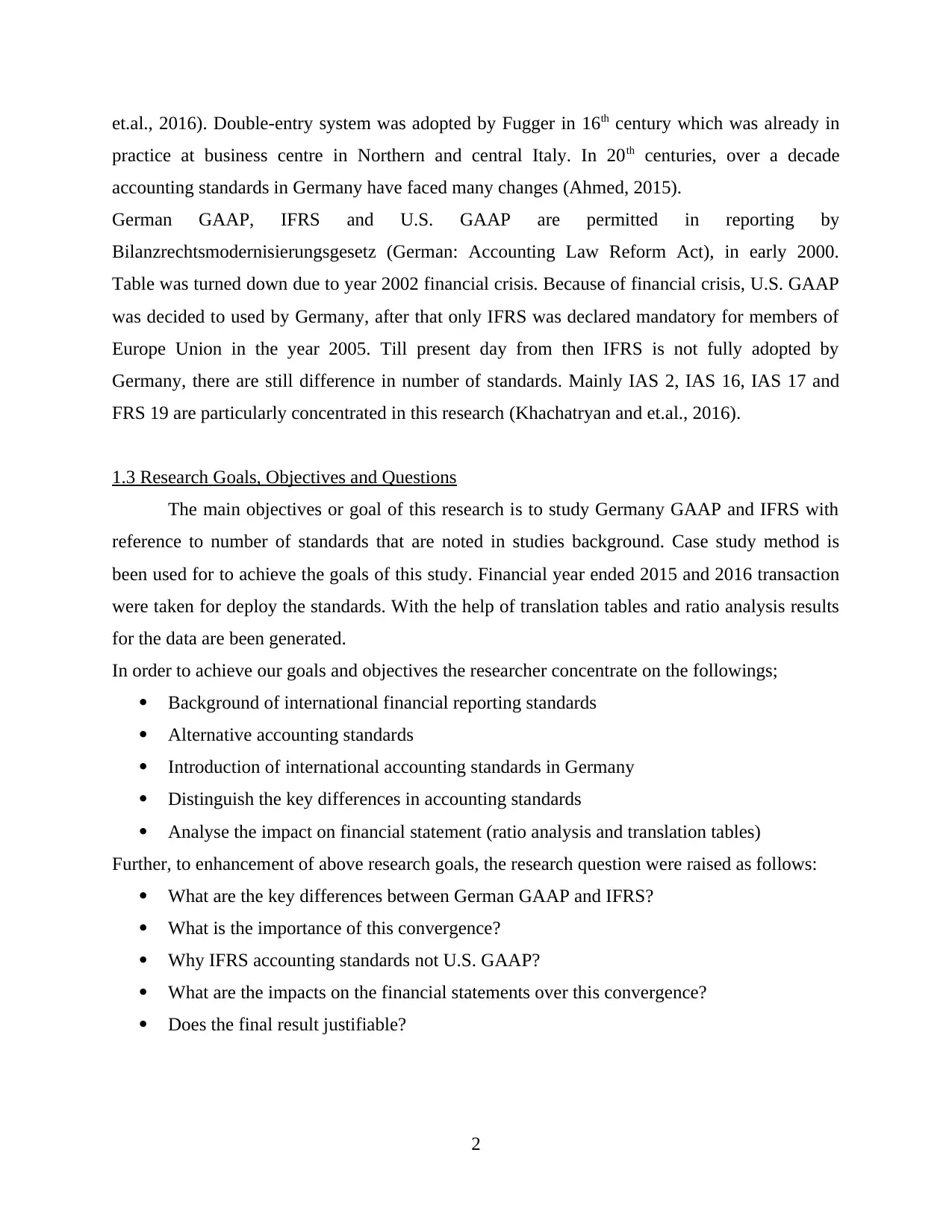
et.al., 2016). Double-entry system was adopted by Fugger in 16th century which was already in
practice at business centre in Northern and central Italy. In 20th centuries, over a decade
accounting standards in Germany have faced many changes (Ahmed, 2015).
German GAAP, IFRS and U.S. GAAP are permitted in reporting by
Bilanzrechtsmodernisierungsgesetz (German: Accounting Law Reform Act), in early 2000.
Table was turned down due to year 2002 financial crisis. Because of financial crisis, U.S. GAAP
was decided to used by Germany, after that only IFRS was declared mandatory for members of
Europe Union in the year 2005. Till present day from then IFRS is not fully adopted by
Germany, there are still difference in number of standards. Mainly IAS 2, IAS 16, IAS 17 and
FRS 19 are particularly concentrated in this research (Khachatryan and et.al., 2016).
1.3 Research Goals, Objectives and Questions
The main objectives or goal of this research is to study Germany GAAP and IFRS with
reference to number of standards that are noted in studies background. Case study method is
been used for to achieve the goals of this study. Financial year ended 2015 and 2016 transaction
were taken for deploy the standards. With the help of translation tables and ratio analysis results
for the data are been generated.
In order to achieve our goals and objectives the researcher concentrate on the followings;
Background of international financial reporting standards
Alternative accounting standards
Introduction of international accounting standards in Germany
Distinguish the key differences in accounting standards
Analyse the impact on financial statement (ratio analysis and translation tables)
Further, to enhancement of above research goals, the research question were raised as follows:
What are the key differences between German GAAP and IFRS?
What is the importance of this convergence?
Why IFRS accounting standards not U.S. GAAP?
What are the impacts on the financial statements over this convergence?
Does the final result justifiable?
2
practice at business centre in Northern and central Italy. In 20th centuries, over a decade
accounting standards in Germany have faced many changes (Ahmed, 2015).
German GAAP, IFRS and U.S. GAAP are permitted in reporting by
Bilanzrechtsmodernisierungsgesetz (German: Accounting Law Reform Act), in early 2000.
Table was turned down due to year 2002 financial crisis. Because of financial crisis, U.S. GAAP
was decided to used by Germany, after that only IFRS was declared mandatory for members of
Europe Union in the year 2005. Till present day from then IFRS is not fully adopted by
Germany, there are still difference in number of standards. Mainly IAS 2, IAS 16, IAS 17 and
FRS 19 are particularly concentrated in this research (Khachatryan and et.al., 2016).
1.3 Research Goals, Objectives and Questions
The main objectives or goal of this research is to study Germany GAAP and IFRS with
reference to number of standards that are noted in studies background. Case study method is
been used for to achieve the goals of this study. Financial year ended 2015 and 2016 transaction
were taken for deploy the standards. With the help of translation tables and ratio analysis results
for the data are been generated.
In order to achieve our goals and objectives the researcher concentrate on the followings;
Background of international financial reporting standards
Alternative accounting standards
Introduction of international accounting standards in Germany
Distinguish the key differences in accounting standards
Analyse the impact on financial statement (ratio analysis and translation tables)
Further, to enhancement of above research goals, the research question were raised as follows:
What are the key differences between German GAAP and IFRS?
What is the importance of this convergence?
Why IFRS accounting standards not U.S. GAAP?
What are the impacts on the financial statements over this convergence?
Does the final result justifiable?
2
Paraphrase This Document
Need a fresh take? Get an instant paraphrase of this document with our AI Paraphraser
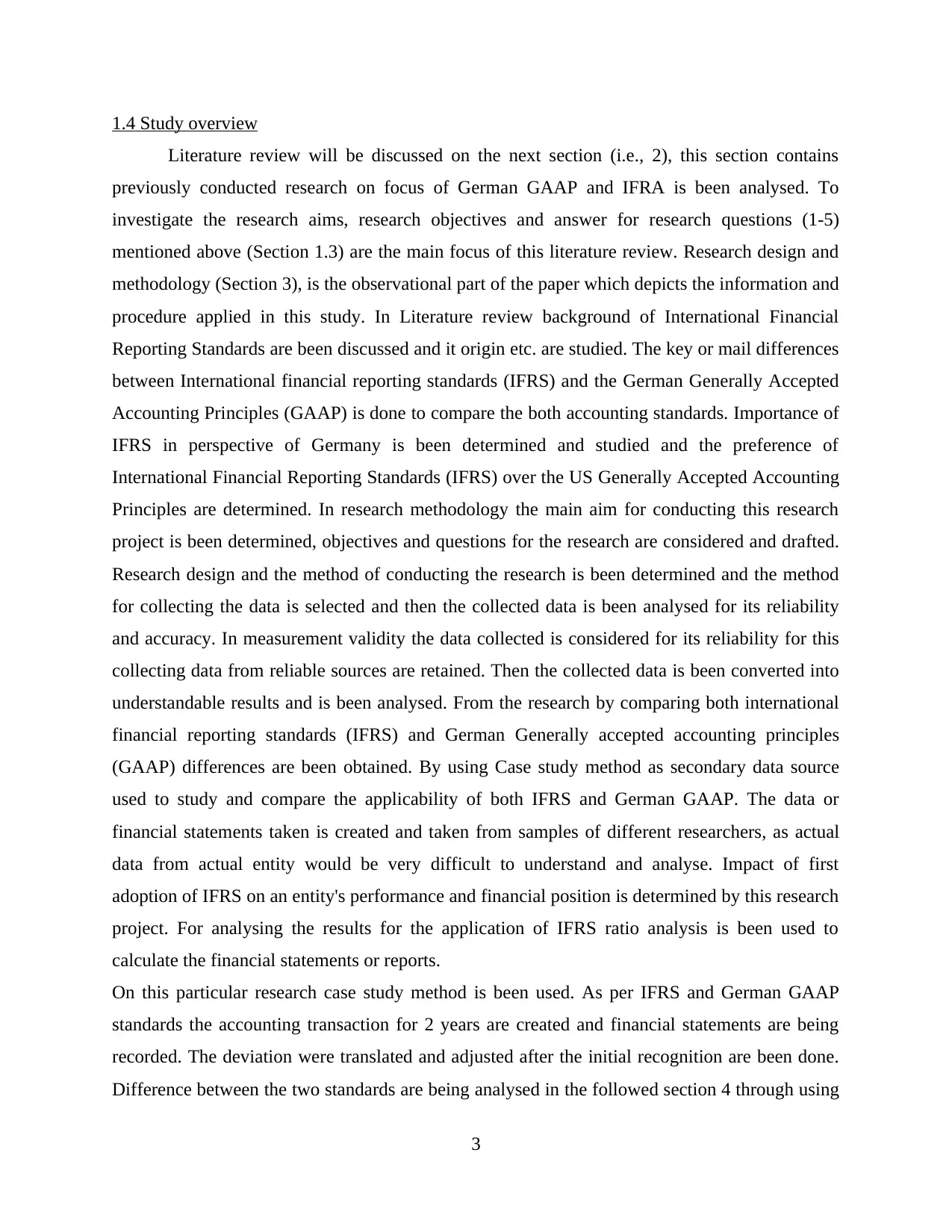
1.4 Study overview
Literature review will be discussed on the next section (i.e., 2), this section contains
previously conducted research on focus of German GAAP and IFRA is been analysed. To
investigate the research aims, research objectives and answer for research questions (1-5)
mentioned above (Section 1.3) are the main focus of this literature review. Research design and
methodology (Section 3), is the observational part of the paper which depicts the information and
procedure applied in this study. In Literature review background of International Financial
Reporting Standards are been discussed and it origin etc. are studied. The key or mail differences
between International financial reporting standards (IFRS) and the German Generally Accepted
Accounting Principles (GAAP) is done to compare the both accounting standards. Importance of
IFRS in perspective of Germany is been determined and studied and the preference of
International Financial Reporting Standards (IFRS) over the US Generally Accepted Accounting
Principles are determined. In research methodology the main aim for conducting this research
project is been determined, objectives and questions for the research are considered and drafted.
Research design and the method of conducting the research is been determined and the method
for collecting the data is selected and then the collected data is been analysed for its reliability
and accuracy. In measurement validity the data collected is considered for its reliability for this
collecting data from reliable sources are retained. Then the collected data is been converted into
understandable results and is been analysed. From the research by comparing both international
financial reporting standards (IFRS) and German Generally accepted accounting principles
(GAAP) differences are been obtained. By using Case study method as secondary data source
used to study and compare the applicability of both IFRS and German GAAP. The data or
financial statements taken is created and taken from samples of different researchers, as actual
data from actual entity would be very difficult to understand and analyse. Impact of first
adoption of IFRS on an entity's performance and financial position is determined by this research
project. For analysing the results for the application of IFRS ratio analysis is been used to
calculate the financial statements or reports.
On this particular research case study method is been used. As per IFRS and German GAAP
standards the accounting transaction for 2 years are created and financial statements are being
recorded. The deviation were translated and adjusted after the initial recognition are been done.
Difference between the two standards are being analysed in the followed section 4 through using
3
Literature review will be discussed on the next section (i.e., 2), this section contains
previously conducted research on focus of German GAAP and IFRA is been analysed. To
investigate the research aims, research objectives and answer for research questions (1-5)
mentioned above (Section 1.3) are the main focus of this literature review. Research design and
methodology (Section 3), is the observational part of the paper which depicts the information and
procedure applied in this study. In Literature review background of International Financial
Reporting Standards are been discussed and it origin etc. are studied. The key or mail differences
between International financial reporting standards (IFRS) and the German Generally Accepted
Accounting Principles (GAAP) is done to compare the both accounting standards. Importance of
IFRS in perspective of Germany is been determined and studied and the preference of
International Financial Reporting Standards (IFRS) over the US Generally Accepted Accounting
Principles are determined. In research methodology the main aim for conducting this research
project is been determined, objectives and questions for the research are considered and drafted.
Research design and the method of conducting the research is been determined and the method
for collecting the data is selected and then the collected data is been analysed for its reliability
and accuracy. In measurement validity the data collected is considered for its reliability for this
collecting data from reliable sources are retained. Then the collected data is been converted into
understandable results and is been analysed. From the research by comparing both international
financial reporting standards (IFRS) and German Generally accepted accounting principles
(GAAP) differences are been obtained. By using Case study method as secondary data source
used to study and compare the applicability of both IFRS and German GAAP. The data or
financial statements taken is created and taken from samples of different researchers, as actual
data from actual entity would be very difficult to understand and analyse. Impact of first
adoption of IFRS on an entity's performance and financial position is determined by this research
project. For analysing the results for the application of IFRS ratio analysis is been used to
calculate the financial statements or reports.
On this particular research case study method is been used. As per IFRS and German GAAP
standards the accounting transaction for 2 years are created and financial statements are being
recorded. The deviation were translated and adjusted after the initial recognition are been done.
Difference between the two standards are being analysed in the followed section 4 through using
3
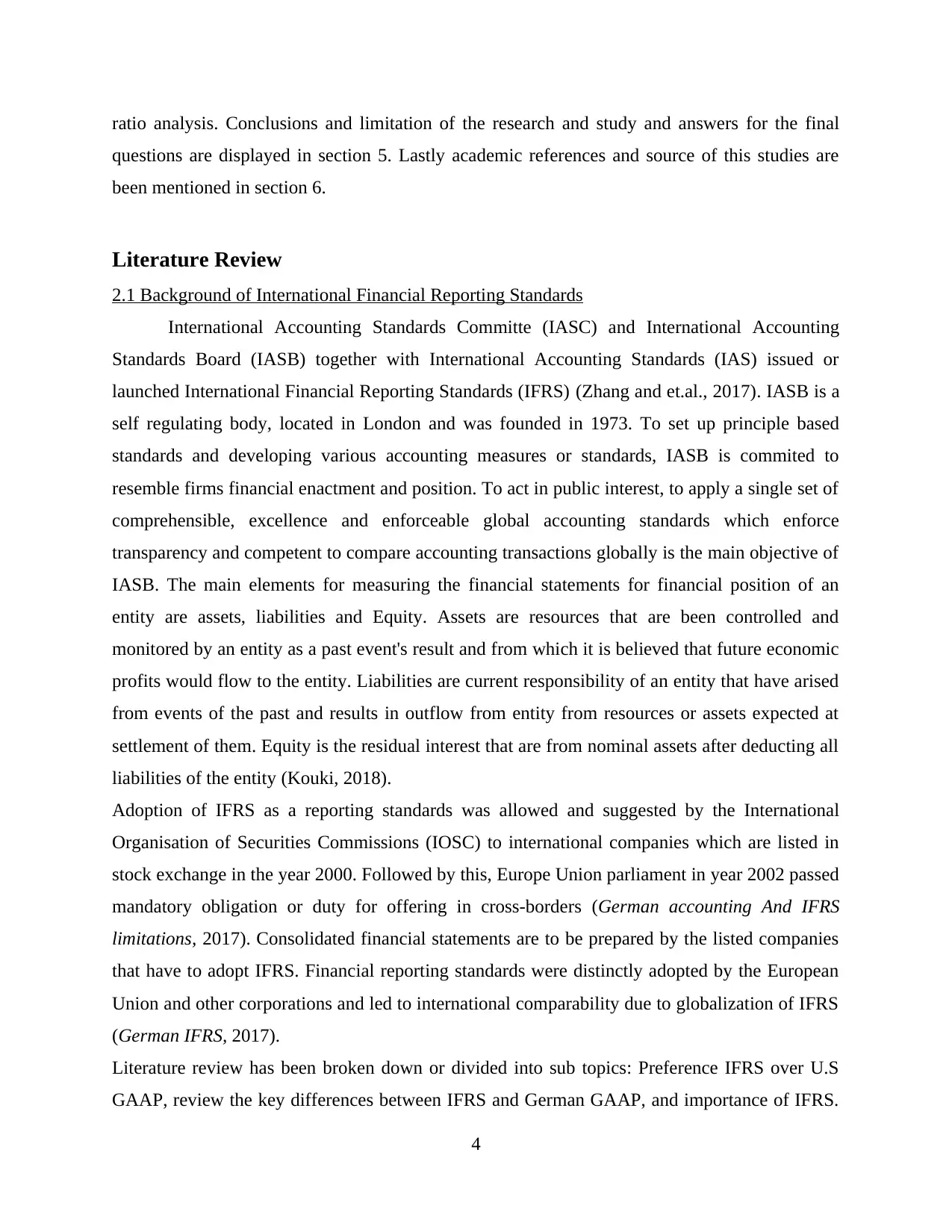
ratio analysis. Conclusions and limitation of the research and study and answers for the final
questions are displayed in section 5. Lastly academic references and source of this studies are
been mentioned in section 6.
Literature Review
2.1 Background of International Financial Reporting Standards
International Accounting Standards Committe (IASC) and International Accounting
Standards Board (IASB) together with International Accounting Standards (IAS) issued or
launched International Financial Reporting Standards (IFRS) (Zhang and et.al., 2017). IASB is a
self regulating body, located in London and was founded in 1973. To set up principle based
standards and developing various accounting measures or standards, IASB is commited to
resemble firms financial enactment and position. To act in public interest, to apply a single set of
comprehensible, excellence and enforceable global accounting standards which enforce
transparency and competent to compare accounting transactions globally is the main objective of
IASB. The main elements for measuring the financial statements for financial position of an
entity are assets, liabilities and Equity. Assets are resources that are been controlled and
monitored by an entity as a past event's result and from which it is believed that future economic
profits would flow to the entity. Liabilities are current responsibility of an entity that have arised
from events of the past and results in outflow from entity from resources or assets expected at
settlement of them. Equity is the residual interest that are from nominal assets after deducting all
liabilities of the entity (Kouki, 2018).
Adoption of IFRS as a reporting standards was allowed and suggested by the International
Organisation of Securities Commissions (IOSC) to international companies which are listed in
stock exchange in the year 2000. Followed by this, Europe Union parliament in year 2002 passed
mandatory obligation or duty for offering in cross-borders (German accounting And IFRS
limitations, 2017). Consolidated financial statements are to be prepared by the listed companies
that have to adopt IFRS. Financial reporting standards were distinctly adopted by the European
Union and other corporations and led to international comparability due to globalization of IFRS
(German IFRS, 2017).
Literature review has been broken down or divided into sub topics: Preference IFRS over U.S
GAAP, review the key differences between IFRS and German GAAP, and importance of IFRS.
4
questions are displayed in section 5. Lastly academic references and source of this studies are
been mentioned in section 6.
Literature Review
2.1 Background of International Financial Reporting Standards
International Accounting Standards Committe (IASC) and International Accounting
Standards Board (IASB) together with International Accounting Standards (IAS) issued or
launched International Financial Reporting Standards (IFRS) (Zhang and et.al., 2017). IASB is a
self regulating body, located in London and was founded in 1973. To set up principle based
standards and developing various accounting measures or standards, IASB is commited to
resemble firms financial enactment and position. To act in public interest, to apply a single set of
comprehensible, excellence and enforceable global accounting standards which enforce
transparency and competent to compare accounting transactions globally is the main objective of
IASB. The main elements for measuring the financial statements for financial position of an
entity are assets, liabilities and Equity. Assets are resources that are been controlled and
monitored by an entity as a past event's result and from which it is believed that future economic
profits would flow to the entity. Liabilities are current responsibility of an entity that have arised
from events of the past and results in outflow from entity from resources or assets expected at
settlement of them. Equity is the residual interest that are from nominal assets after deducting all
liabilities of the entity (Kouki, 2018).
Adoption of IFRS as a reporting standards was allowed and suggested by the International
Organisation of Securities Commissions (IOSC) to international companies which are listed in
stock exchange in the year 2000. Followed by this, Europe Union parliament in year 2002 passed
mandatory obligation or duty for offering in cross-borders (German accounting And IFRS
limitations, 2017). Consolidated financial statements are to be prepared by the listed companies
that have to adopt IFRS. Financial reporting standards were distinctly adopted by the European
Union and other corporations and led to international comparability due to globalization of IFRS
(German IFRS, 2017).
Literature review has been broken down or divided into sub topics: Preference IFRS over U.S
GAAP, review the key differences between IFRS and German GAAP, and importance of IFRS.
4
⊘ This is a preview!⊘
Do you want full access?
Subscribe today to unlock all pages.

Trusted by 1+ million students worldwide
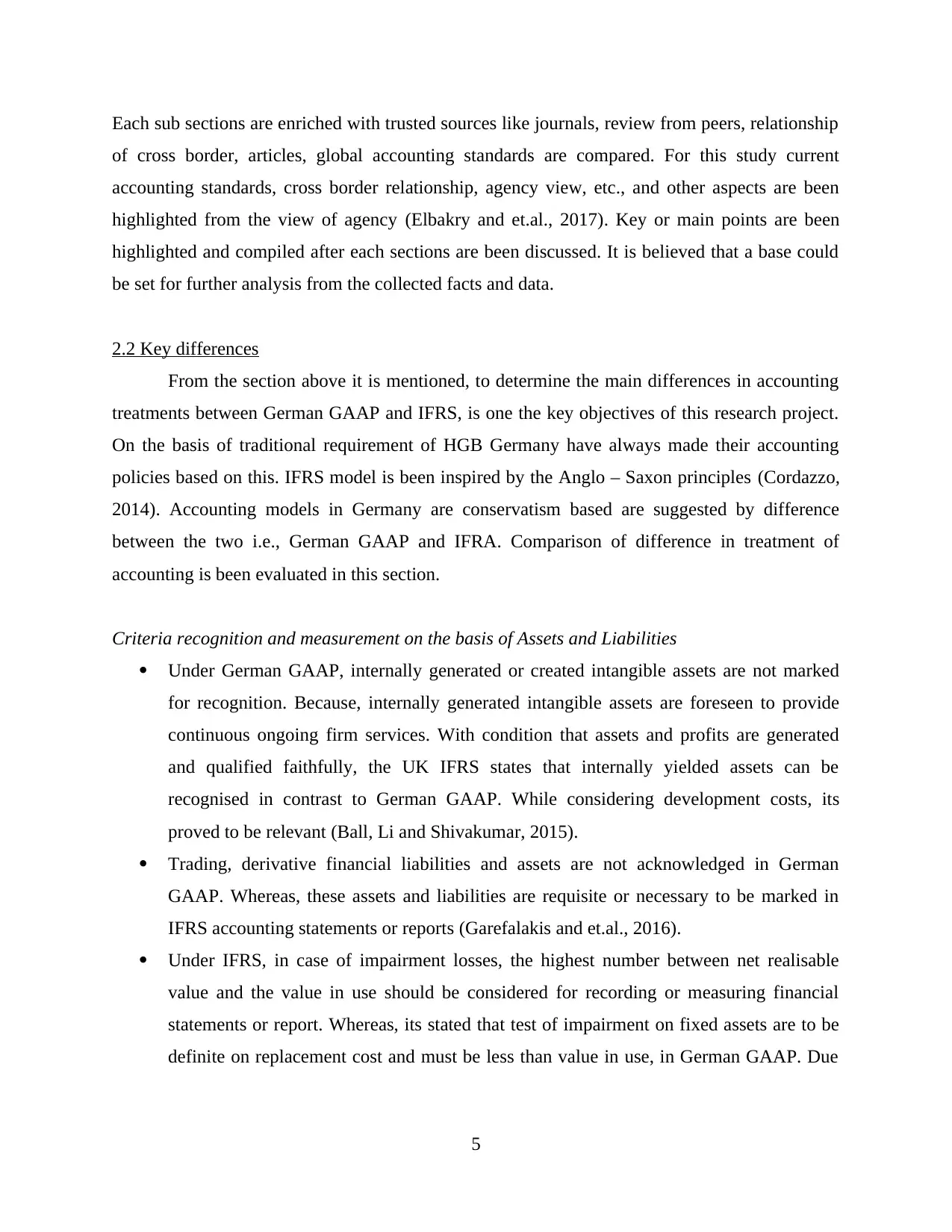
Each sub sections are enriched with trusted sources like journals, review from peers, relationship
of cross border, articles, global accounting standards are compared. For this study current
accounting standards, cross border relationship, agency view, etc., and other aspects are been
highlighted from the view of agency (Elbakry and et.al., 2017). Key or main points are been
highlighted and compiled after each sections are been discussed. It is believed that a base could
be set for further analysis from the collected facts and data.
2.2 Key differences
From the section above it is mentioned, to determine the main differences in accounting
treatments between German GAAP and IFRS, is one the key objectives of this research project.
On the basis of traditional requirement of HGB Germany have always made their accounting
policies based on this. IFRS model is been inspired by the Anglo – Saxon principles (Cordazzo,
2014). Accounting models in Germany are conservatism based are suggested by difference
between the two i.e., German GAAP and IFRA. Comparison of difference in treatment of
accounting is been evaluated in this section.
Criteria recognition and measurement on the basis of Assets and Liabilities
Under German GAAP, internally generated or created intangible assets are not marked
for recognition. Because, internally generated intangible assets are foreseen to provide
continuous ongoing firm services. With condition that assets and profits are generated
and qualified faithfully, the UK IFRS states that internally yielded assets can be
recognised in contrast to German GAAP. While considering development costs, its
proved to be relevant (Ball, Li and Shivakumar, 2015).
Trading, derivative financial liabilities and assets are not acknowledged in German
GAAP. Whereas, these assets and liabilities are requisite or necessary to be marked in
IFRS accounting statements or reports (Garefalakis and et.al., 2016).
Under IFRS, in case of impairment losses, the highest number between net realisable
value and the value in use should be considered for recording or measuring financial
statements or report. Whereas, its stated that test of impairment on fixed assets are to be
definite on replacement cost and must be less than value in use, in German GAAP. Due
5
of cross border, articles, global accounting standards are compared. For this study current
accounting standards, cross border relationship, agency view, etc., and other aspects are been
highlighted from the view of agency (Elbakry and et.al., 2017). Key or main points are been
highlighted and compiled after each sections are been discussed. It is believed that a base could
be set for further analysis from the collected facts and data.
2.2 Key differences
From the section above it is mentioned, to determine the main differences in accounting
treatments between German GAAP and IFRS, is one the key objectives of this research project.
On the basis of traditional requirement of HGB Germany have always made their accounting
policies based on this. IFRS model is been inspired by the Anglo – Saxon principles (Cordazzo,
2014). Accounting models in Germany are conservatism based are suggested by difference
between the two i.e., German GAAP and IFRA. Comparison of difference in treatment of
accounting is been evaluated in this section.
Criteria recognition and measurement on the basis of Assets and Liabilities
Under German GAAP, internally generated or created intangible assets are not marked
for recognition. Because, internally generated intangible assets are foreseen to provide
continuous ongoing firm services. With condition that assets and profits are generated
and qualified faithfully, the UK IFRS states that internally yielded assets can be
recognised in contrast to German GAAP. While considering development costs, its
proved to be relevant (Ball, Li and Shivakumar, 2015).
Trading, derivative financial liabilities and assets are not acknowledged in German
GAAP. Whereas, these assets and liabilities are requisite or necessary to be marked in
IFRS accounting statements or reports (Garefalakis and et.al., 2016).
Under IFRS, in case of impairment losses, the highest number between net realisable
value and the value in use should be considered for recording or measuring financial
statements or report. Whereas, its stated that test of impairment on fixed assets are to be
definite on replacement cost and must be less than value in use, in German GAAP. Due
5
Paraphrase This Document
Need a fresh take? Get an instant paraphrase of this document with our AI Paraphraser
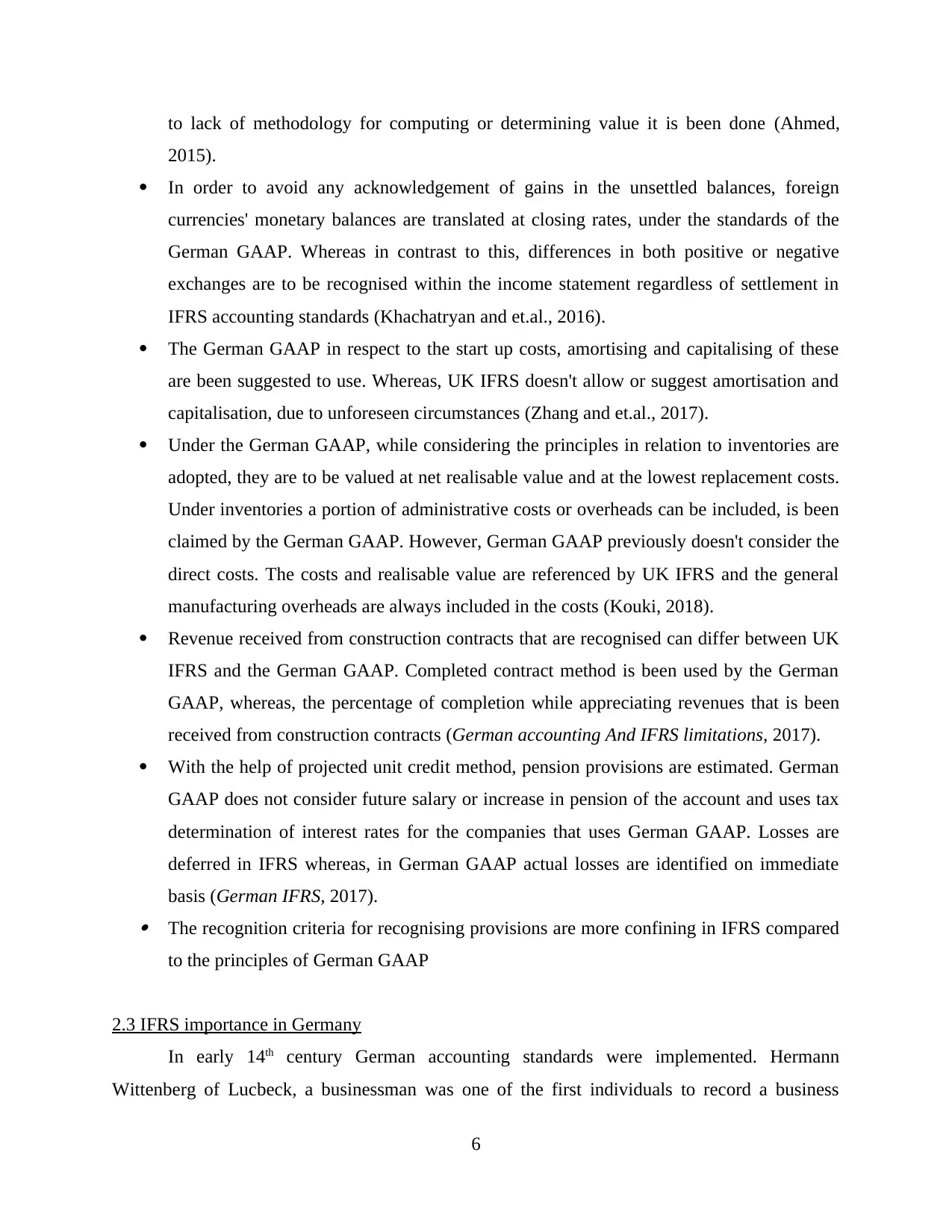
to lack of methodology for computing or determining value it is been done (Ahmed,
2015).
In order to avoid any acknowledgement of gains in the unsettled balances, foreign
currencies' monetary balances are translated at closing rates, under the standards of the
German GAAP. Whereas in contrast to this, differences in both positive or negative
exchanges are to be recognised within the income statement regardless of settlement in
IFRS accounting standards (Khachatryan and et.al., 2016).
The German GAAP in respect to the start up costs, amortising and capitalising of these
are been suggested to use. Whereas, UK IFRS doesn't allow or suggest amortisation and
capitalisation, due to unforeseen circumstances (Zhang and et.al., 2017).
Under the German GAAP, while considering the principles in relation to inventories are
adopted, they are to be valued at net realisable value and at the lowest replacement costs.
Under inventories a portion of administrative costs or overheads can be included, is been
claimed by the German GAAP. However, German GAAP previously doesn't consider the
direct costs. The costs and realisable value are referenced by UK IFRS and the general
manufacturing overheads are always included in the costs (Kouki, 2018).
Revenue received from construction contracts that are recognised can differ between UK
IFRS and the German GAAP. Completed contract method is been used by the German
GAAP, whereas, the percentage of completion while appreciating revenues that is been
received from construction contracts (German accounting And IFRS limitations, 2017).
With the help of projected unit credit method, pension provisions are estimated. German
GAAP does not consider future salary or increase in pension of the account and uses tax
determination of interest rates for the companies that uses German GAAP. Losses are
deferred in IFRS whereas, in German GAAP actual losses are identified on immediate
basis (German IFRS, 2017). The recognition criteria for recognising provisions are more confining in IFRS compared
to the principles of German GAAP
2.3 IFRS importance in Germany
In early 14th century German accounting standards were implemented. Hermann
Wittenberg of Lucbeck, a businessman was one of the first individuals to record a business
6
2015).
In order to avoid any acknowledgement of gains in the unsettled balances, foreign
currencies' monetary balances are translated at closing rates, under the standards of the
German GAAP. Whereas in contrast to this, differences in both positive or negative
exchanges are to be recognised within the income statement regardless of settlement in
IFRS accounting standards (Khachatryan and et.al., 2016).
The German GAAP in respect to the start up costs, amortising and capitalising of these
are been suggested to use. Whereas, UK IFRS doesn't allow or suggest amortisation and
capitalisation, due to unforeseen circumstances (Zhang and et.al., 2017).
Under the German GAAP, while considering the principles in relation to inventories are
adopted, they are to be valued at net realisable value and at the lowest replacement costs.
Under inventories a portion of administrative costs or overheads can be included, is been
claimed by the German GAAP. However, German GAAP previously doesn't consider the
direct costs. The costs and realisable value are referenced by UK IFRS and the general
manufacturing overheads are always included in the costs (Kouki, 2018).
Revenue received from construction contracts that are recognised can differ between UK
IFRS and the German GAAP. Completed contract method is been used by the German
GAAP, whereas, the percentage of completion while appreciating revenues that is been
received from construction contracts (German accounting And IFRS limitations, 2017).
With the help of projected unit credit method, pension provisions are estimated. German
GAAP does not consider future salary or increase in pension of the account and uses tax
determination of interest rates for the companies that uses German GAAP. Losses are
deferred in IFRS whereas, in German GAAP actual losses are identified on immediate
basis (German IFRS, 2017). The recognition criteria for recognising provisions are more confining in IFRS compared
to the principles of German GAAP
2.3 IFRS importance in Germany
In early 14th century German accounting standards were implemented. Hermann
Wittenberg of Lucbeck, a businessman was one of the first individuals to record a business
6
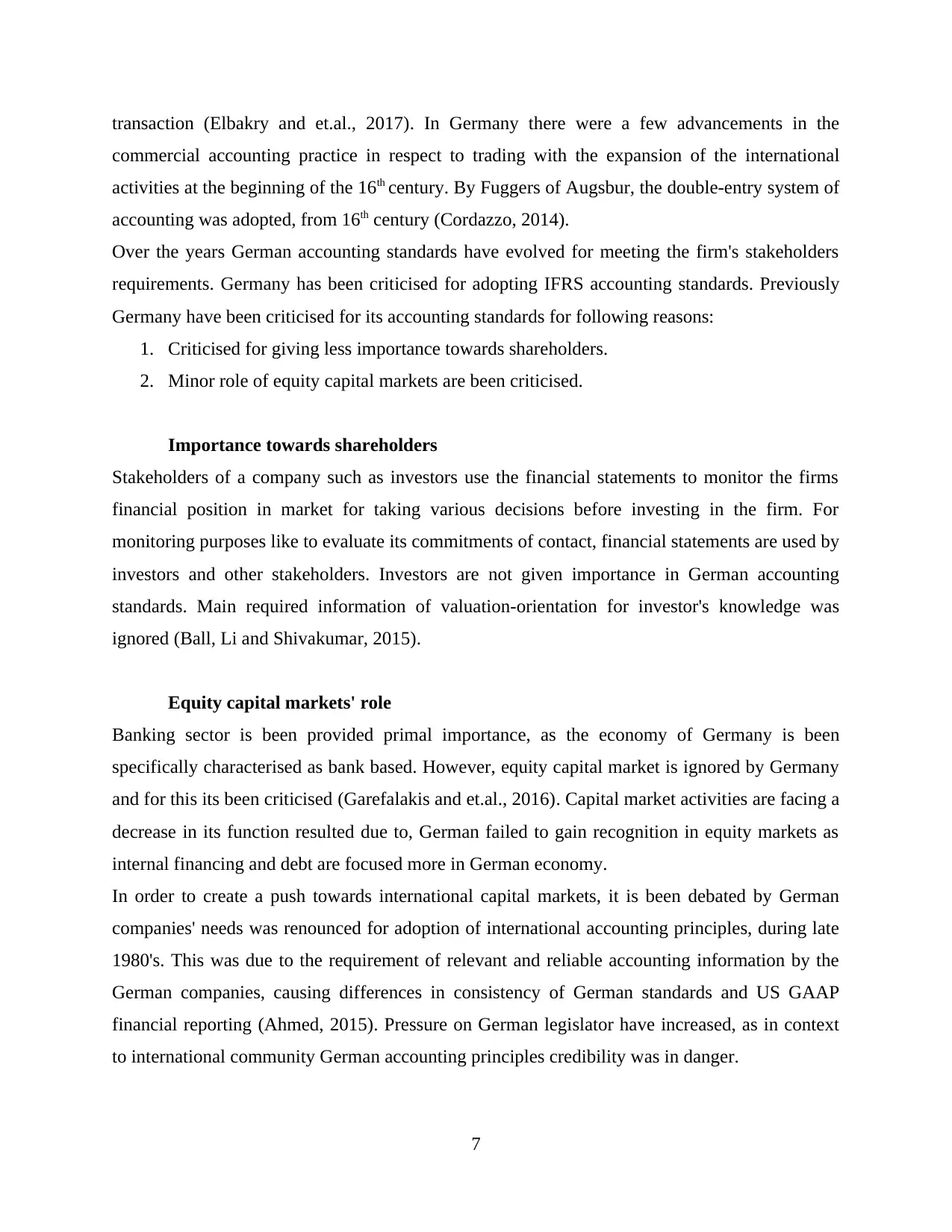
transaction (Elbakry and et.al., 2017). In Germany there were a few advancements in the
commercial accounting practice in respect to trading with the expansion of the international
activities at the beginning of the 16th century. By Fuggers of Augsbur, the double-entry system of
accounting was adopted, from 16th century (Cordazzo, 2014).
Over the years German accounting standards have evolved for meeting the firm's stakeholders
requirements. Germany has been criticised for adopting IFRS accounting standards. Previously
Germany have been criticised for its accounting standards for following reasons:
1. Criticised for giving less importance towards shareholders.
2. Minor role of equity capital markets are been criticised.
Importance towards shareholders
Stakeholders of a company such as investors use the financial statements to monitor the firms
financial position in market for taking various decisions before investing in the firm. For
monitoring purposes like to evaluate its commitments of contact, financial statements are used by
investors and other stakeholders. Investors are not given importance in German accounting
standards. Main required information of valuation-orientation for investor's knowledge was
ignored (Ball, Li and Shivakumar, 2015).
Equity capital markets' role
Banking sector is been provided primal importance, as the economy of Germany is been
specifically characterised as bank based. However, equity capital market is ignored by Germany
and for this its been criticised (Garefalakis and et.al., 2016). Capital market activities are facing a
decrease in its function resulted due to, German failed to gain recognition in equity markets as
internal financing and debt are focused more in German economy.
In order to create a push towards international capital markets, it is been debated by German
companies' needs was renounced for adoption of international accounting principles, during late
1980's. This was due to the requirement of relevant and reliable accounting information by the
German companies, causing differences in consistency of German standards and US GAAP
financial reporting (Ahmed, 2015). Pressure on German legislator have increased, as in context
to international community German accounting principles credibility was in danger.
7
commercial accounting practice in respect to trading with the expansion of the international
activities at the beginning of the 16th century. By Fuggers of Augsbur, the double-entry system of
accounting was adopted, from 16th century (Cordazzo, 2014).
Over the years German accounting standards have evolved for meeting the firm's stakeholders
requirements. Germany has been criticised for adopting IFRS accounting standards. Previously
Germany have been criticised for its accounting standards for following reasons:
1. Criticised for giving less importance towards shareholders.
2. Minor role of equity capital markets are been criticised.
Importance towards shareholders
Stakeholders of a company such as investors use the financial statements to monitor the firms
financial position in market for taking various decisions before investing in the firm. For
monitoring purposes like to evaluate its commitments of contact, financial statements are used by
investors and other stakeholders. Investors are not given importance in German accounting
standards. Main required information of valuation-orientation for investor's knowledge was
ignored (Ball, Li and Shivakumar, 2015).
Equity capital markets' role
Banking sector is been provided primal importance, as the economy of Germany is been
specifically characterised as bank based. However, equity capital market is ignored by Germany
and for this its been criticised (Garefalakis and et.al., 2016). Capital market activities are facing a
decrease in its function resulted due to, German failed to gain recognition in equity markets as
internal financing and debt are focused more in German economy.
In order to create a push towards international capital markets, it is been debated by German
companies' needs was renounced for adoption of international accounting principles, during late
1980's. This was due to the requirement of relevant and reliable accounting information by the
German companies, causing differences in consistency of German standards and US GAAP
financial reporting (Ahmed, 2015). Pressure on German legislator have increased, as in context
to international community German accounting principles credibility was in danger.
7
⊘ This is a preview!⊘
Do you want full access?
Subscribe today to unlock all pages.

Trusted by 1+ million students worldwide
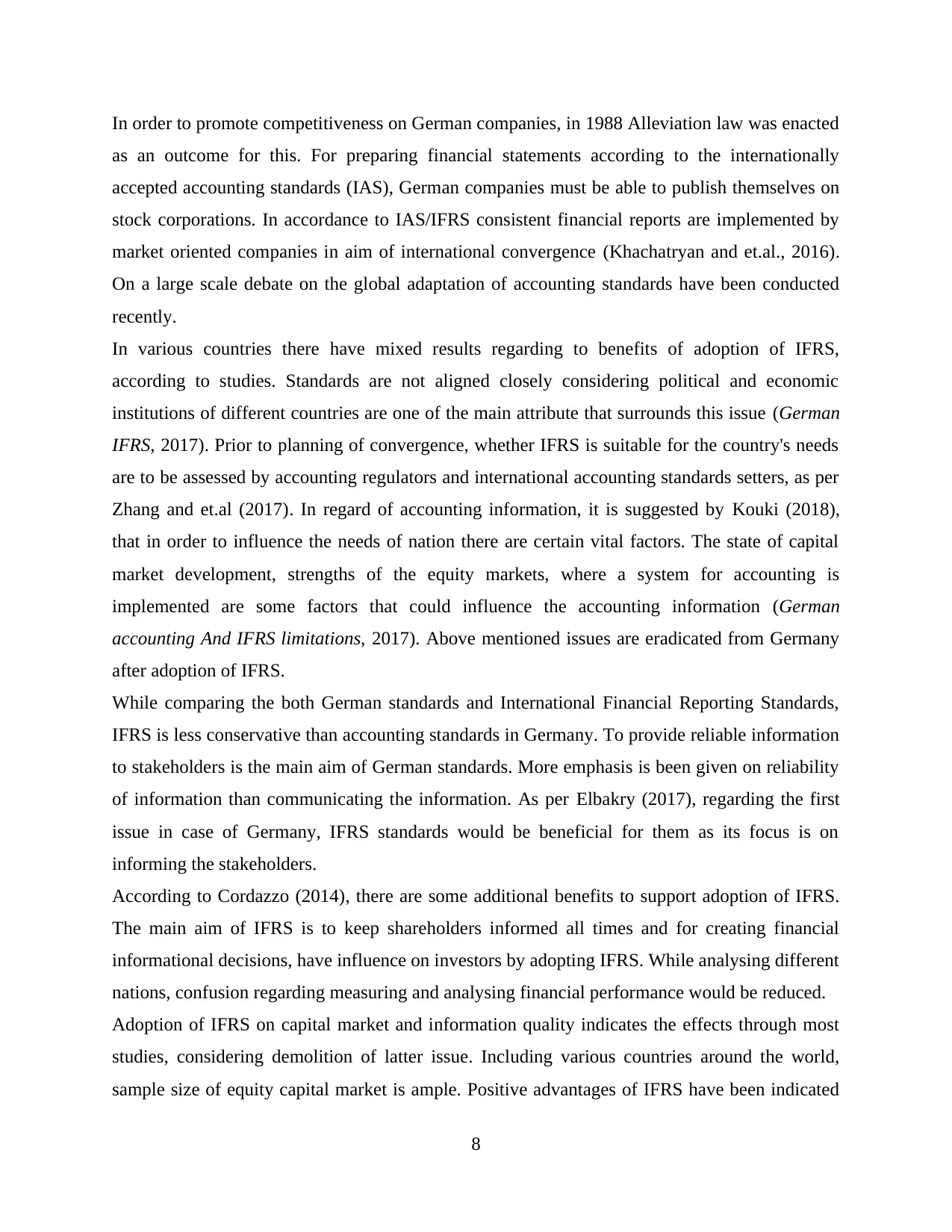
In order to promote competitiveness on German companies, in 1988 Alleviation law was enacted
as an outcome for this. For preparing financial statements according to the internationally
accepted accounting standards (IAS), German companies must be able to publish themselves on
stock corporations. In accordance to IAS/IFRS consistent financial reports are implemented by
market oriented companies in aim of international convergence (Khachatryan and et.al., 2016).
On a large scale debate on the global adaptation of accounting standards have been conducted
recently.
In various countries there have mixed results regarding to benefits of adoption of IFRS,
according to studies. Standards are not aligned closely considering political and economic
institutions of different countries are one of the main attribute that surrounds this issue (German
IFRS, 2017). Prior to planning of convergence, whether IFRS is suitable for the country's needs
are to be assessed by accounting regulators and international accounting standards setters, as per
Zhang and et.al (2017). In regard of accounting information, it is suggested by Kouki (2018),
that in order to influence the needs of nation there are certain vital factors. The state of capital
market development, strengths of the equity markets, where a system for accounting is
implemented are some factors that could influence the accounting information (German
accounting And IFRS limitations, 2017). Above mentioned issues are eradicated from Germany
after adoption of IFRS.
While comparing the both German standards and International Financial Reporting Standards,
IFRS is less conservative than accounting standards in Germany. To provide reliable information
to stakeholders is the main aim of German standards. More emphasis is been given on reliability
of information than communicating the information. As per Elbakry (2017), regarding the first
issue in case of Germany, IFRS standards would be beneficial for them as its focus is on
informing the stakeholders.
According to Cordazzo (2014), there are some additional benefits to support adoption of IFRS.
The main aim of IFRS is to keep shareholders informed all times and for creating financial
informational decisions, have influence on investors by adopting IFRS. While analysing different
nations, confusion regarding measuring and analysing financial performance would be reduced.
Adoption of IFRS on capital market and information quality indicates the effects through most
studies, considering demolition of latter issue. Including various countries around the world,
sample size of equity capital market is ample. Positive advantages of IFRS have been indicated
8
as an outcome for this. For preparing financial statements according to the internationally
accepted accounting standards (IAS), German companies must be able to publish themselves on
stock corporations. In accordance to IAS/IFRS consistent financial reports are implemented by
market oriented companies in aim of international convergence (Khachatryan and et.al., 2016).
On a large scale debate on the global adaptation of accounting standards have been conducted
recently.
In various countries there have mixed results regarding to benefits of adoption of IFRS,
according to studies. Standards are not aligned closely considering political and economic
institutions of different countries are one of the main attribute that surrounds this issue (German
IFRS, 2017). Prior to planning of convergence, whether IFRS is suitable for the country's needs
are to be assessed by accounting regulators and international accounting standards setters, as per
Zhang and et.al (2017). In regard of accounting information, it is suggested by Kouki (2018),
that in order to influence the needs of nation there are certain vital factors. The state of capital
market development, strengths of the equity markets, where a system for accounting is
implemented are some factors that could influence the accounting information (German
accounting And IFRS limitations, 2017). Above mentioned issues are eradicated from Germany
after adoption of IFRS.
While comparing the both German standards and International Financial Reporting Standards,
IFRS is less conservative than accounting standards in Germany. To provide reliable information
to stakeholders is the main aim of German standards. More emphasis is been given on reliability
of information than communicating the information. As per Elbakry (2017), regarding the first
issue in case of Germany, IFRS standards would be beneficial for them as its focus is on
informing the stakeholders.
According to Cordazzo (2014), there are some additional benefits to support adoption of IFRS.
The main aim of IFRS is to keep shareholders informed all times and for creating financial
informational decisions, have influence on investors by adopting IFRS. While analysing different
nations, confusion regarding measuring and analysing financial performance would be reduced.
Adoption of IFRS on capital market and information quality indicates the effects through most
studies, considering demolition of latter issue. Including various countries around the world,
sample size of equity capital market is ample. Positive advantages of IFRS have been indicated
8
Paraphrase This Document
Need a fresh take? Get an instant paraphrase of this document with our AI Paraphraser
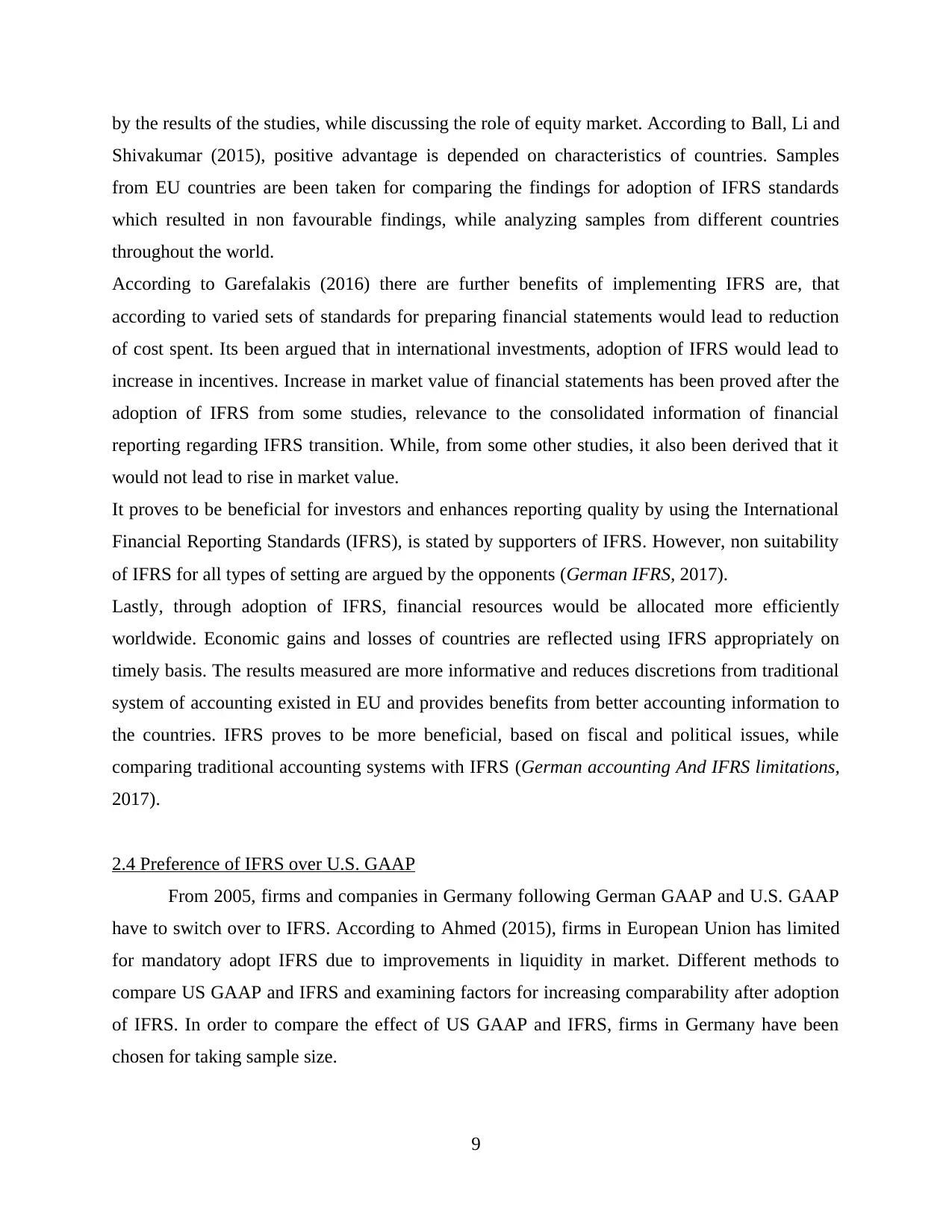
by the results of the studies, while discussing the role of equity market. According to Ball, Li and
Shivakumar (2015), positive advantage is depended on characteristics of countries. Samples
from EU countries are been taken for comparing the findings for adoption of IFRS standards
which resulted in non favourable findings, while analyzing samples from different countries
throughout the world.
According to Garefalakis (2016) there are further benefits of implementing IFRS are, that
according to varied sets of standards for preparing financial statements would lead to reduction
of cost spent. Its been argued that in international investments, adoption of IFRS would lead to
increase in incentives. Increase in market value of financial statements has been proved after the
adoption of IFRS from some studies, relevance to the consolidated information of financial
reporting regarding IFRS transition. While, from some other studies, it also been derived that it
would not lead to rise in market value.
It proves to be beneficial for investors and enhances reporting quality by using the International
Financial Reporting Standards (IFRS), is stated by supporters of IFRS. However, non suitability
of IFRS for all types of setting are argued by the opponents (German IFRS, 2017).
Lastly, through adoption of IFRS, financial resources would be allocated more efficiently
worldwide. Economic gains and losses of countries are reflected using IFRS appropriately on
timely basis. The results measured are more informative and reduces discretions from traditional
system of accounting existed in EU and provides benefits from better accounting information to
the countries. IFRS proves to be more beneficial, based on fiscal and political issues, while
comparing traditional accounting systems with IFRS (German accounting And IFRS limitations,
2017).
2.4 Preference of IFRS over U.S. GAAP
From 2005, firms and companies in Germany following German GAAP and U.S. GAAP
have to switch over to IFRS. According to Ahmed (2015), firms in European Union has limited
for mandatory adopt IFRS due to improvements in liquidity in market. Different methods to
compare US GAAP and IFRS and examining factors for increasing comparability after adoption
of IFRS. In order to compare the effect of US GAAP and IFRS, firms in Germany have been
chosen for taking sample size.
9
Shivakumar (2015), positive advantage is depended on characteristics of countries. Samples
from EU countries are been taken for comparing the findings for adoption of IFRS standards
which resulted in non favourable findings, while analyzing samples from different countries
throughout the world.
According to Garefalakis (2016) there are further benefits of implementing IFRS are, that
according to varied sets of standards for preparing financial statements would lead to reduction
of cost spent. Its been argued that in international investments, adoption of IFRS would lead to
increase in incentives. Increase in market value of financial statements has been proved after the
adoption of IFRS from some studies, relevance to the consolidated information of financial
reporting regarding IFRS transition. While, from some other studies, it also been derived that it
would not lead to rise in market value.
It proves to be beneficial for investors and enhances reporting quality by using the International
Financial Reporting Standards (IFRS), is stated by supporters of IFRS. However, non suitability
of IFRS for all types of setting are argued by the opponents (German IFRS, 2017).
Lastly, through adoption of IFRS, financial resources would be allocated more efficiently
worldwide. Economic gains and losses of countries are reflected using IFRS appropriately on
timely basis. The results measured are more informative and reduces discretions from traditional
system of accounting existed in EU and provides benefits from better accounting information to
the countries. IFRS proves to be more beneficial, based on fiscal and political issues, while
comparing traditional accounting systems with IFRS (German accounting And IFRS limitations,
2017).
2.4 Preference of IFRS over U.S. GAAP
From 2005, firms and companies in Germany following German GAAP and U.S. GAAP
have to switch over to IFRS. According to Ahmed (2015), firms in European Union has limited
for mandatory adopt IFRS due to improvements in liquidity in market. Different methods to
compare US GAAP and IFRS and examining factors for increasing comparability after adoption
of IFRS. In order to compare the effect of US GAAP and IFRS, firms in Germany have been
chosen for taking sample size.
9
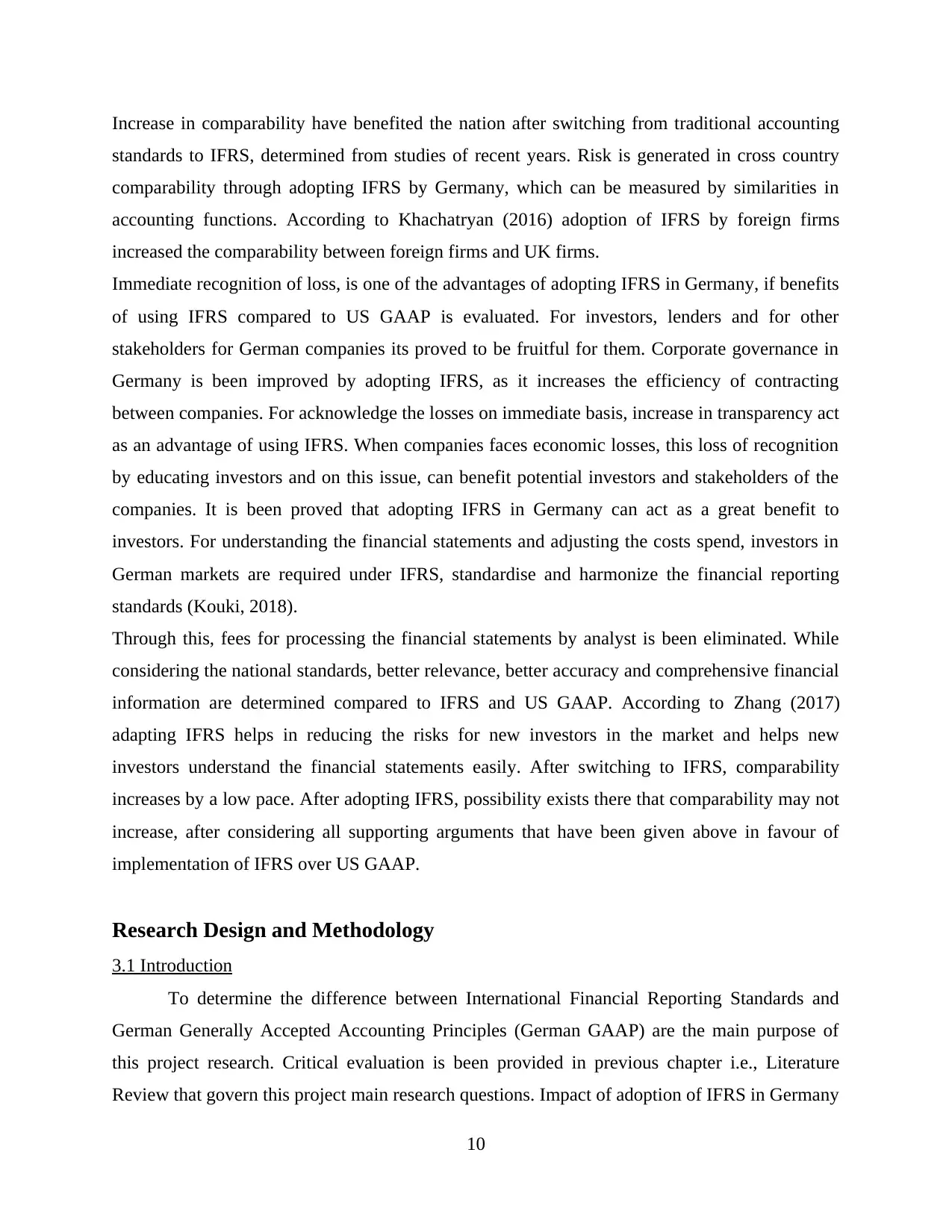
Increase in comparability have benefited the nation after switching from traditional accounting
standards to IFRS, determined from studies of recent years. Risk is generated in cross country
comparability through adopting IFRS by Germany, which can be measured by similarities in
accounting functions. According to Khachatryan (2016) adoption of IFRS by foreign firms
increased the comparability between foreign firms and UK firms.
Immediate recognition of loss, is one of the advantages of adopting IFRS in Germany, if benefits
of using IFRS compared to US GAAP is evaluated. For investors, lenders and for other
stakeholders for German companies its proved to be fruitful for them. Corporate governance in
Germany is been improved by adopting IFRS, as it increases the efficiency of contracting
between companies. For acknowledge the losses on immediate basis, increase in transparency act
as an advantage of using IFRS. When companies faces economic losses, this loss of recognition
by educating investors and on this issue, can benefit potential investors and stakeholders of the
companies. It is been proved that adopting IFRS in Germany can act as a great benefit to
investors. For understanding the financial statements and adjusting the costs spend, investors in
German markets are required under IFRS, standardise and harmonize the financial reporting
standards (Kouki, 2018).
Through this, fees for processing the financial statements by analyst is been eliminated. While
considering the national standards, better relevance, better accuracy and comprehensive financial
information are determined compared to IFRS and US GAAP. According to Zhang (2017)
adapting IFRS helps in reducing the risks for new investors in the market and helps new
investors understand the financial statements easily. After switching to IFRS, comparability
increases by a low pace. After adopting IFRS, possibility exists there that comparability may not
increase, after considering all supporting arguments that have been given above in favour of
implementation of IFRS over US GAAP.
Research Design and Methodology
3.1 Introduction
To determine the difference between International Financial Reporting Standards and
German Generally Accepted Accounting Principles (German GAAP) are the main purpose of
this project research. Critical evaluation is been provided in previous chapter i.e., Literature
Review that govern this project main research questions. Impact of adoption of IFRS in Germany
10
standards to IFRS, determined from studies of recent years. Risk is generated in cross country
comparability through adopting IFRS by Germany, which can be measured by similarities in
accounting functions. According to Khachatryan (2016) adoption of IFRS by foreign firms
increased the comparability between foreign firms and UK firms.
Immediate recognition of loss, is one of the advantages of adopting IFRS in Germany, if benefits
of using IFRS compared to US GAAP is evaluated. For investors, lenders and for other
stakeholders for German companies its proved to be fruitful for them. Corporate governance in
Germany is been improved by adopting IFRS, as it increases the efficiency of contracting
between companies. For acknowledge the losses on immediate basis, increase in transparency act
as an advantage of using IFRS. When companies faces economic losses, this loss of recognition
by educating investors and on this issue, can benefit potential investors and stakeholders of the
companies. It is been proved that adopting IFRS in Germany can act as a great benefit to
investors. For understanding the financial statements and adjusting the costs spend, investors in
German markets are required under IFRS, standardise and harmonize the financial reporting
standards (Kouki, 2018).
Through this, fees for processing the financial statements by analyst is been eliminated. While
considering the national standards, better relevance, better accuracy and comprehensive financial
information are determined compared to IFRS and US GAAP. According to Zhang (2017)
adapting IFRS helps in reducing the risks for new investors in the market and helps new
investors understand the financial statements easily. After switching to IFRS, comparability
increases by a low pace. After adopting IFRS, possibility exists there that comparability may not
increase, after considering all supporting arguments that have been given above in favour of
implementation of IFRS over US GAAP.
Research Design and Methodology
3.1 Introduction
To determine the difference between International Financial Reporting Standards and
German Generally Accepted Accounting Principles (German GAAP) are the main purpose of
this project research. Critical evaluation is been provided in previous chapter i.e., Literature
Review that govern this project main research questions. Impact of adoption of IFRS in Germany
10
⊘ This is a preview!⊘
Do you want full access?
Subscribe today to unlock all pages.

Trusted by 1+ million students worldwide
1 out of 37
Related Documents
Your All-in-One AI-Powered Toolkit for Academic Success.
+13062052269
info@desklib.com
Available 24*7 on WhatsApp / Email
![[object Object]](/_next/static/media/star-bottom.7253800d.svg)
Unlock your academic potential
Copyright © 2020–2026 A2Z Services. All Rights Reserved. Developed and managed by ZUCOL.





